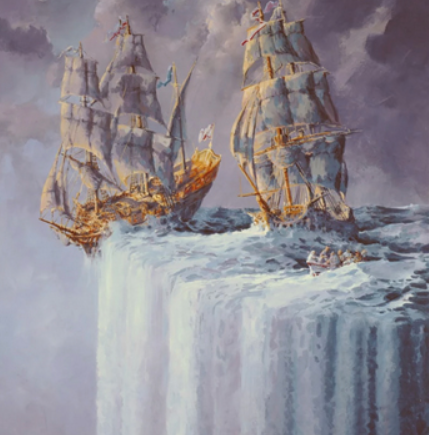A month ago, if you asked me to define the word “apocalypse,” I probably would have said “the end of the world.” While this isn’t necessarily wrong, my understandings of how the world could end were certainly limited to media depictions of it. My very first thought may have been of The Walking Dead, which I was an avid viewer of for several years, and I would have mentally pictured Rick Grimes walking out of that abandoned hospital, seeing that discarded teddy bear on the ground and seeing the very first zombie, or what’s more canonically accepted as a “walker.” Now, if I hadn’t thought of The Walking Dead and the context led me more towards thinking of a destruction of the Earth, maybe I would have thought of The 100, in which nuclear bombs being set off across the planet prompt a society of people escape to and survive in space long enough for radiation levels to drop enough for the Earth to be survivable again. I followed this show for years as well and both certainly shaped my perception of an apocalypse as one of the greatest worst-case scenarios there could be. (I mean, the whole “the world is ending!!!” concept seems reasonably frightening.)
However, as we begin to familiarize ourselves with core course terminology and concepts, my understanding of the apocalypse is changing. Of course, there’s still this connection to the end of life as we know it but I’m wondering now if the connotations of the apocalypse were always as negative as I have previously perceived them to be.
There’s an important link between the apocalyptic shows I mentioned before that I think has prevented me from seeing an apocalypse as anything but “bad.” In The Walking Dead, we are introduced to numerous survivor communities, ranging in scale and power, as Rick and his crew travel across the country when disaster strikes their own community. Similarly, in The 100, the first season tells about “the 100,” a group consisting mostly of delinquents who were banished to the Earth in order to preserve oxygen on the ship and test radiation levels, and the “grounders,” who survived the initial nuclear fallout and rebuilt their lives on Earth. So, we have different communities or even societies developing in each show, which allows people to share their skills and knowledge with each other to heighten their chances of survival. However, many of these groups tend to be anti-social and isolationist, which leads to intense violence between them, entire groups being wiped out when others become paranoid or power-hungry. As Arkady Martine points out in their article What Really Happens After the Apocalypse, “Most of apocalyptic literature focuses on all the terrible ways that society goes wrong after a society-disrupting disaster” and how “while the zombies might be the initial threat, most of the horrible violence is done by surviving humans to one another.” This was one of the reasons why I stopped following The Walking Dead, as the particularly gruesome killing of a favored character by other survivors had me sick to my stomach for hours.
It was these characteristics of the apocalyptic media I have consumed that made me believe that an apocalypse was one of the worst things that could happen to society. But, as we read the Andrew Santana Kaplan essay “Notes Toward (Inhabiting) the Black Messianic in Afro-Pessimism’s Apocalyptic Thought,” I began to consider that maybe an apocalypse could benefit society or, as Santana Kaplan seems to argue, it may even be necessary. If I am interpreting this essay—which I admit is far beyond my own scholarly abilities—as intended, the foundations of civil society are cast in error as it was built through the enslavement of millions of people of color. So, even as society has adjusted with the goal of equality and inclusion, these changes are just that: adjustments. If we were to imagine the nation as a house, we could say that the structures it was built on are extremely flawed but instead of tearing them down and beginning again, we instead continue adding additions to the house with hopes of making it better. Santana Kaplan argues that the house needs to be torn down completely through an apocalypse since “true justice demands the end of the World.” Again, this is just my interpretation of the article and I am not claiming this is exactly what Santana Kaplan is arguing in their literary work but rather that this is what I understand from it. My interpretation absolutely could be in need of re-examination and changing.
Now, considering this argument, surely an apocalypse could be a “good” thing for society. But there’s one more piece I haven’t mentioned yet that could change this perception as well. Quoting from Giorgio Agamben’s The Signature of All Things: On Method, Santana Kaplan introduces that “The paradigm is not merely a particular phenomenon, nor is it a universal, but is rather a ‘singular case that is isolated from its context only insofar as, by exhibiting its own singularity, it makes intelligible a new ensemble.’” This suggests that an apocalypse isn’t necessarily society-wide but can be personal, individual. After all, apocalypse “primarily means to un-cover” as Santana Kaplan also notes. This means that an apocalypse means a revelation of something that can happen on an individual or collective level. On a collective level, Santana Kaplan suggests that it could lead to “true justice” but on an individual level, it could mean many different things since each person would experience it differently.
To explore whether an apocalypse could be “good” or “bad” on an individual level, I will now turn to course texts since, so far, we have seen several instances of characters experiencing personal catastrophes.
In Wild Seed, numerous characters experience apocalypses, especially those who go through transitions in their adolescence, which is a span of time in which those believed to have special powers begin to truly develop them, often through seeing and feeling the lives of others. I’ll focus on the main characters, Doro and Anyanwu, though. As disclosed in Book Two, Doro went through transition at age thirteen which revealed to him “that he was both more and less than a man” and he “discovered that he could have and do absolutely anything.” As Doro can preserve his consciousness while jumping to other bodies, he has the power of immortality, allowing him to accumulate resources and power over time as he develops the goal to create others like him. While this power could be desirable by some and considered a great revelation, Octavia Butler also expresses in Book Two that Doro feels “utterly alone, forever alone, longing to die and be finished.” So, even though some part of Doro seems to be satisfied in the divine worship he receives from his followers who are mostly people with powers like him, he’s also extremely lonely since they all live mortal lives and die.
Anyanwu is one of these followers of Doro, but not by choice. Doro first seeks her out when he senses her abilities while looking for missing members of his own family. When he does find her, Doro threatens her children and grandchildren in order to pressure her into moving to colonial America with him with the goal of creating children with powers as great as hers, perhaps even long-lived or immortal children. This is expressed in Book Three as Butler writes “He made it sound as though her choice had been free, as though he had not coerced her into choosing.” Aside from not giving her a choice, in Book Two, it is also relayed that Anyanwu “remembered her sudden panic when Doro took her from her people,” which was an apocalyptic event from her since the world, as she knew it, ended and she was forced to learn the language, values, and practices of a new one.
In American Desert, the main character, Theodore Street, also experiences an apocalypse after his head is severed in a car accident and is stitched back on so that his body can be presented at his open-casket funeral, where he proceeds to wake up and exit his coffin. Within the readings so far, this is where we see the most influence of media depictions of apocalypses as Percival Everett writes that “Ted’s resurrection caused a stir, a terrible riot which spread from the church and into the streets, resulting later in the arrest of seven gang members who saw the shocked, enlightened mass as prime targets for robbery and their general entertainment.” Despite the reactions of the public, it is also noted in the novel that on a personal level, “Having survived death hadn’t erased his painful assessment of himself as a person” and that he even became “impressed by his capacity to feel such overwhelming and disparate things, his intense love of his family, his need for knowledge of their safety and his dread of the dangers which awaited them beyond the walls of their house.” Based on these lines, amongst others, it seems like Ted’s resurrection has brought him more knowledge, both of the disparities in society and also of the kind of man he wants to be and how he wants to treat his family. Now that I’ve explored my prior understandings of the apocalypse, Santana Kaplan’s argument, and personal apocalypses from the texts we’ve read so far, I feel more ready to make my hypothesis. An apocalypse to me, right now, doesn’t seem “good” or “bad,” one or the other, but rather a both/and. There can be good and bad. Greatly, this is possible because of the ability of an apocalypse to be personal since, at its root, it is a revelation. It doesn’t have to be on grand-scale to the entirety of society, the whole world. It can be on grand-scale for one person, the entire world as they know it. I look forward to seeing how future literary texts will interact with this hypothesis and how they may, to me, support it or prove it false.


